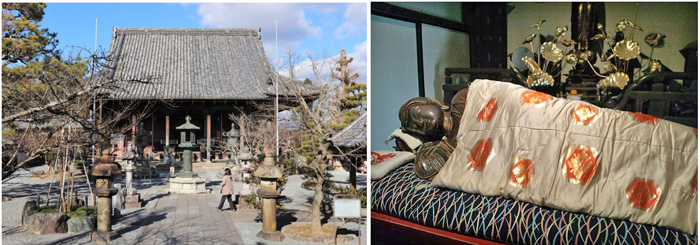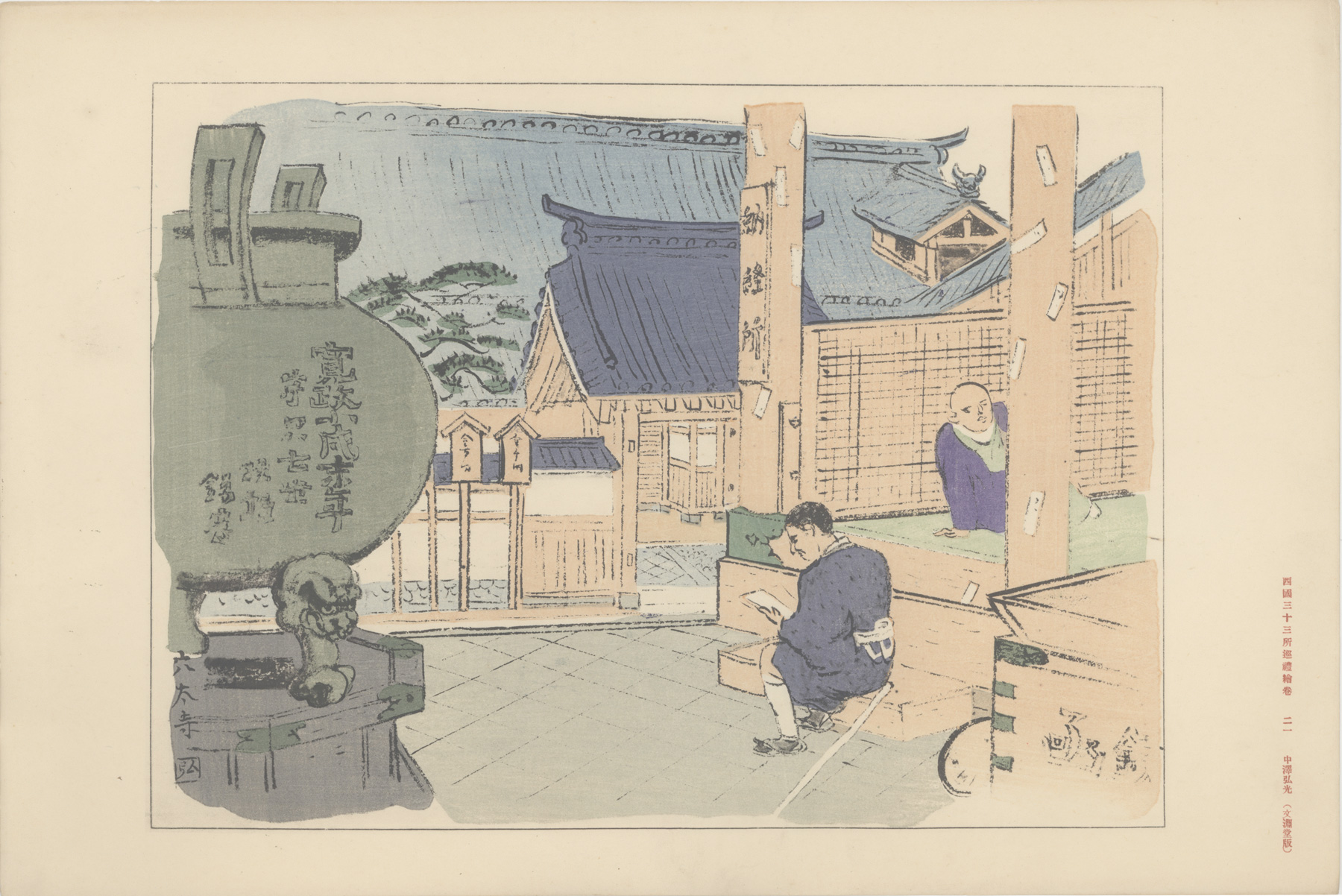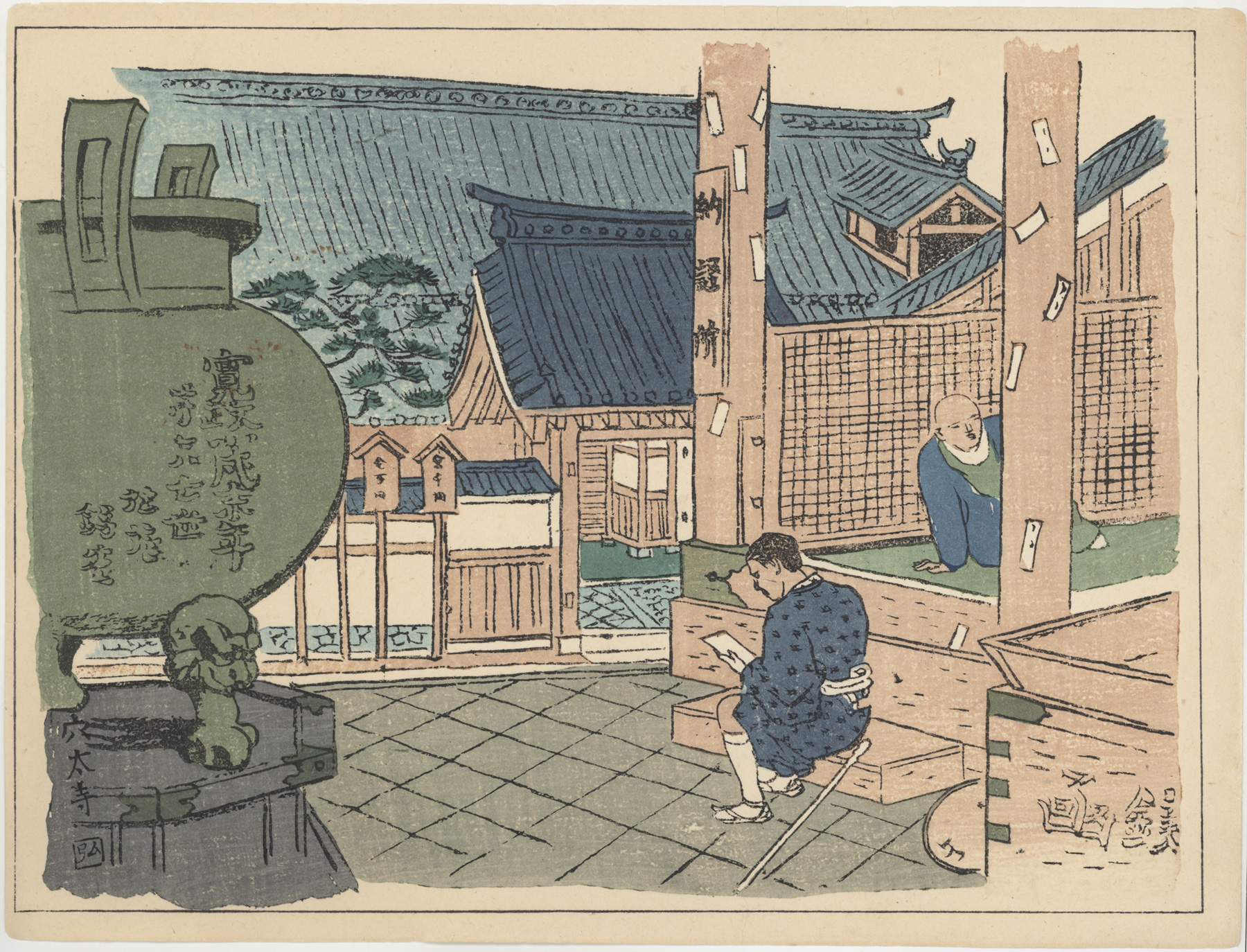About This Print
Nakazawa depicts a pilgrim with a votive offering in his hands, likely a monetary donation, on the steps of the temple office (納経所 nōkyōsho is written on the post) while a temple monk looks on. Anao-ji is the 21st temple in the Saigoku Kannon Pilgrimage.On December 1923, only a few months after the Great Kantō Earthquake devastated the Tokyo area, Nakazawa along with his two friends, the poet Ishikura Suiyō and the artist Akatsuka Chūichi, began their pilgrimage to the thirty-three temples comprising the Saigoku Kannon Pilgrimage, taking seventy-eight days to complete the route.
For more information on their pilgrimage see the article Nakazawa Hiromitsu - Picture Album of the Thirty-Three Pilgrimage Places of the Western Provinces.
Sources: Website of Kameoak City Tourism Association http://www.kyototourism.org/en/sightseeing-info/3965anaoji.html
and website of japanese-wiki-corpus https://www.japanese-wiki-corpus.com/shrines/Anao-ji%20Temple.html

left: Anao-ji main temple (hondo) right: Shaka-Nehanzō, the sleeping Buddha statue
According to temple records it was founded in the Tanba region in 705 during the latter half of the Asuka period by the nobleman and holder of many government positions Otomo no Komaro (? - 757) under the order of Emperor Monmu (r. 697-707). The precinct includes a Japanese garden, constructed in the Edo period, that incorporates the main hall and Tahoto pagoda into its design.
The Saigoku Kannon Pilgrimage (Saigoku sanjūsansho junrei)
Japan's most famous pilgrimage, originating in the 11th century, encompasses 33 Buddhist temples in Western Japan (Kansai region) dedicated to Kannon (bodhisattva Avalokitasvara), the Bodhisattva of Compassion, who hears the cries of the world and assists anyone in distress.
The 33 temples on the approximately 1,000 kilometer pilgrimage route correspond to Kannon's ability to take on 33 different forms. One hundred thousand pilgrims navigate the route in its entirety or part each year.
Note: For a listing of all 33 temples go to https://en.wikipedia.org/wiki/Saigoku_Kannon_Pilgrimage. To access an interactive map of the route and its temples go to https://www.thetempleguy.org/p/saigoku-33-kannon-route.html and scroll down towards the bottom of the page.
About the "Picture Album of the Thirty-Three Pilgrimage Places of the Western Provinces"
First issued in 1925 and reprinted in 1946, the 1925 album contains 58 prints and the 1946 album 59 prints. For detailed discussion of the two editions and additional information on the Saigoku Kannon Pilgrimage see this site's article Nakazawa Hiromitsu - Picture Album of the Thirty-Three Pilgrimage Places of the Western Provinces.
Print Details
IHL Catalog
#2413.29 (1925 release) and #1857 (1946 release) Title or Description Anao-ji (temple 21)
穴太寺 (二十一) Series Picture Album of the Thirty-Three Pilgrimage Places of the Western Provinces
西国三十三所巡礼画巻 Saigoku sanjūsansho junrei gakan Artist Nakazawa Hiromitsu (1874-1964)
Signature  IHL Cat. #2413.29 (1925 release): 中澤弘光 [Nakazawa Hiromitsu] printed in lower right margin as shown left
IHL Cat. #2413.29 (1925 release): 中澤弘光 [Nakazawa Hiromitsu] printed in lower right margin as shown left
IHL Cat. #1857 (1946 release): not signed Seal of the artist 
 弘 Hiro
弘 Hiro
left: #2413.29 (1925 release)
right: #1857 (1946 release) Publication Date IHL Cat. #2413.29: Published September 28, 1925 大正十四年九月十八日発行 as printed in the 1925 album's colophon (see Album Box with Print of Kannon IHL Cat. #2413).
Note: an earlier date of June 15, 1925 大正十四年六月十五日 appears in the right margin of the print titled Matsunoo-dera [IHL Cat. #2245], the only print in the 1925 album which carries a date. This earlier date, however, is the date that the censor's approval was obtained, as further explained on this site's web page for Matsunoo-dera, rather than the publishing date.
IHL Cat. #1857: January 18, 1946 昭和二十一年一月十八日発行 [Individual prints in the 1946 release are not dated. This date taken from a 1946 album colophon.] Publisher 發行者 金尾種次郎 publisher Kanao Tanejirō
發兌元 金尾文淵堂 publishing house Kanao Bun'endō
 IHL Cat. #2413.29 (1925 release): 文淵堂版 [Bun'endō han] printed in lower right margin as shown left
IHL Cat. #2413.29 (1925 release): 文淵堂版 [Bun'endō han] printed in lower right margin as shown left
IHL Cat. #1857 (1946 release): no publisher seal
Carver Okada Seijirō 岡田清次郎
Note: the album's colophon (see Album Box with Print of Kannon IHL Cat. 2413) lists two carvers, the above well-known Okada Seijirō and 大倉藤太郎, possibly read Okura Tōtarō, who I can find no information on. Printer IHL Cat. #2413.29 (1925 release): Nishimura Kumakichi 西村熊吉
Note: the colophon for the 1925 album (see Album Box with Print of Kannon IHL Cat. 2413) lists three printers, the above well-known Nishmura Kumakichi; 山県秀助, possibly read Yamagata Hidesuki, who I can find no information on, and 松本兄弟堂, a company founded in Osaka by Matsumoto Kisaburō 松本喜三郎 in 1923, which I believe did the letterpress printing.
IHL Cat. #1857 (1946 release): Nishimura Kumakichi 西村熊吉 and
Takagi Seikō (Takagi Kiyomitsu?) 高木淸光
Note: the above information is taken from the colophon included in the 1946 release. I could find no information on the second printer listed for the 1946 release 高木淸光.
Note on Nishimura Kumakichi: listed as one of the printers for both the 1925 and 1946 release, there is some uncertainty about the date of his death, although a birth date, either 1861 or 1862 [Guide to Modern Japanese Woodblock Prints, Merritt, p. 223], is generally accepted. A death date of 1941 is sometimes given and 1955 has been suggested, but Merritt provides no date of death. If he truly did the printing for the 1946 release he would have been around 85 at that time. Impression IHL Cat. #2413.29: good
IHL Cat. #1857: good - print border and image not aligned with margin borders during printing or paper trimming
Colors IHL Cat. #2413.29: excellent
IHL Cat. #1857: excellent Condition IHL Cat. #2413.29: good - pinhole lower left margin; minor paper folds
IHL Cat. #1857: good - minor marks and soiling; paper folds along top margin Genre shin hanga; shasei kikō (sketch-tour) Miscellaneous  temple/print number 21 appearing in the right margin of the 1925 release
temple/print number 21 appearing in the right margin of the 1925 release Format horizontal oban
H x W Paper
IHL Cat. #2413.29: 10 1/8 x 15 3/16 (25.7 x 38.6 cm)
IHL Cat. #1857: 10 1/8 x 15 1/4 in. (25.7 x 38.7 cm) H x W Image
IHL Cat. #2413.29: 8 7/16 x 11 1/2 in. (21.4 x 29.2 cm)
IHL Cat. #1857: 8 1/2 x 11 9/16 in. (21.6 x 29.4 cm) Literature Nakazawa Hiromitsu kenkyū: Hon karano kenshō, Hiromitsu Nakazawa, Mitsunobu Satō, et. al., Mitsui Kōkei, Tokyo, 2006, p. 46-48. Collections This Print
National Diet Library Call Number 寄別7-8-2-5 (1925 album, no images displayed); National Library Board, Singapore BRN:9854371 (entire 1946 album, no images shown); British Library System number: 017018582 (entire 1946 album, no images shown); Harvard Yenching Library HOLLIS number 990082993710203941 (1925 album, no images displayed)
| IHL Catalog | #2413.29 (1925 release) and #1857 (1946 release) |
| Title or Description | Anao-ji (temple 21) 穴太寺 (二十一) |
| Series | Picture Album of the Thirty-Three Pilgrimage Places of the Western Provinces 西国三十三所巡礼画巻 Saigoku sanjūsansho junrei gakan |
| Artist | Nakazawa Hiromitsu (1874-1964) |
| Signature |  IHL Cat. #1857 (1946 release): not signed |
| Seal of the artist |   left: #2413.29 (1925 release) right: #1857 (1946 release) |
| Publication Date | IHL Cat. #2413.29: Published September 28, 1925 大正十四年九月十八日発行 as printed in the 1925 album's colophon (see Album Box with Print of Kannon IHL Cat. #2413). Note: an earlier date of June 15, 1925 大正十四年六月十五日 appears in the right margin of the print titled Matsunoo-dera [IHL Cat. #2245], the only print in the 1925 album which carries a date. This earlier date, however, is the date that the censor's approval was obtained, as further explained on this site's web page for Matsunoo-dera, rather than the publishing date. IHL Cat. #1857: January 18, 1946 昭和二十一年一月十八日発行 [Individual prints in the 1946 release are not dated. This date taken from a 1946 album colophon.] |
| Publisher | 發行者 金尾種次郎 publisher Kanao Tanejirō 發兌元 金尾文淵堂 publishing house Kanao Bun'endō  IHL Cat. #1857 (1946 release): no publisher seal |
| Carver | Okada Seijirō 岡田清次郎 Note: the album's colophon (see Album Box with Print of Kannon IHL Cat. 2413) lists two carvers, the above well-known Okada Seijirō and 大倉藤太郎, possibly read Okura Tōtarō, who I can find no information on. |
| Printer | IHL Cat. #2413.29 (1925 release): Nishimura Kumakichi 西村熊吉 Note: the colophon for the 1925 album (see Album Box with Print of Kannon IHL Cat. 2413) lists three printers, the above well-known Nishmura Kumakichi; 山県秀助, possibly read Yamagata Hidesuki, who I can find no information on, and 松本兄弟堂, a company founded in Osaka by Matsumoto Kisaburō 松本喜三郎 in 1923, which I believe did the letterpress printing. IHL Cat. #1857 (1946 release): Nishimura Kumakichi 西村熊吉 and Takagi Seikō (Takagi Kiyomitsu?) 高木淸光 Note: the above information is taken from the colophon included in the 1946 release. I could find no information on the second printer listed for the 1946 release 高木淸光. Note on Nishimura Kumakichi: listed as one of the printers for both the 1925 and 1946 release, there is some uncertainty about the date of his death, although a birth date, either 1861 or 1862 [Guide to Modern Japanese Woodblock Prints, Merritt, p. 223], is generally accepted. A death date of 1941 is sometimes given and 1955 has been suggested, but Merritt provides no date of death. If he truly did the printing for the 1946 release he would have been around 85 at that time. |
| Impression | IHL Cat. #2413.29: good IHL Cat. #1857: good - print border and image not aligned with margin borders during printing or paper trimming |
| Colors | IHL Cat. #2413.29: excellent IHL Cat. #1857: excellent |
| Condition | IHL Cat. #2413.29: good - pinhole lower left margin; minor paper folds IHL Cat. #1857: good - minor marks and soiling; paper folds along top margin |
| Genre | shin hanga; shasei kikō (sketch-tour) |
| Miscellaneous |  |
| Format | horizontal oban |
| H x W Paper | IHL Cat. #2413.29: 10 1/8 x 15 3/16 (25.7 x 38.6 cm) IHL Cat. #1857: 10 1/8 x 15 1/4 in. (25.7 x 38.7 cm) |
| H x W Image | IHL Cat. #2413.29: 8 7/16 x 11 1/2 in. (21.4 x 29.2 cm) IHL Cat. #1857: 8 1/2 x 11 9/16 in. (21.6 x 29.4 cm) |
| Literature | Nakazawa Hiromitsu kenkyū: Hon karano kenshō, Hiromitsu Nakazawa, Mitsunobu Satō, et. al., Mitsui Kōkei, Tokyo, 2006, p. 46-48. |
| Collections This Print | National Diet Library Call Number 寄別7-8-2-5 (1925 album, no images displayed); National Library Board, Singapore BRN:9854371 (entire 1946 album, no images shown); British Library System number: 017018582 (entire 1946 album, no images shown); Harvard Yenching Library HOLLIS number 990082993710203941 (1925 album, no images displayed) |
last revision:
1/21/2021
12/20/2020
7/4/2020
2/22/2020
1/6/2020 created



